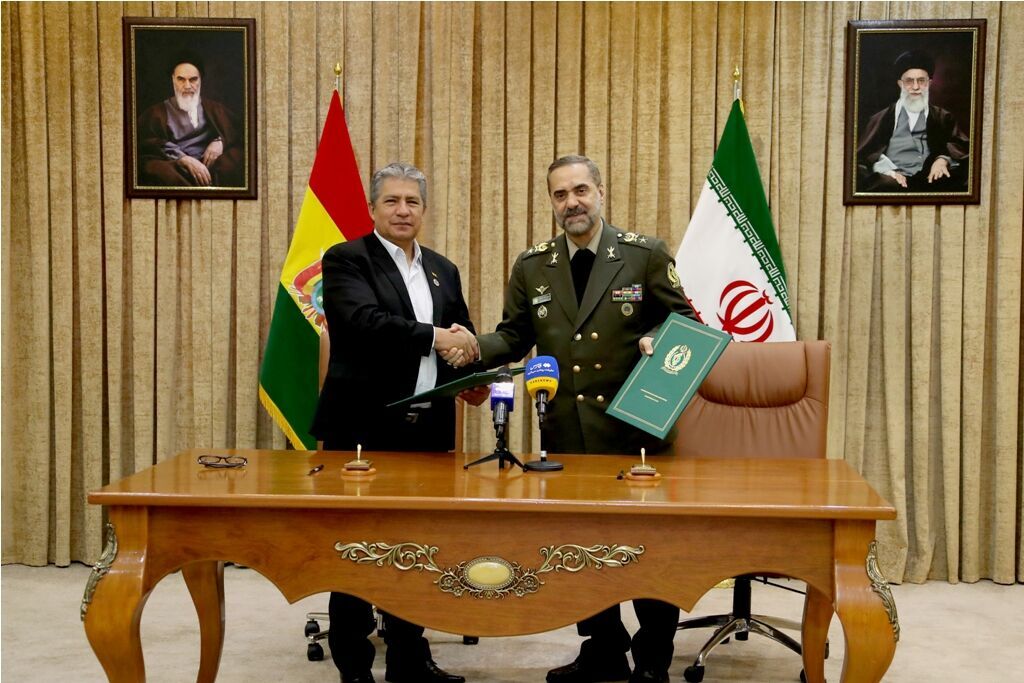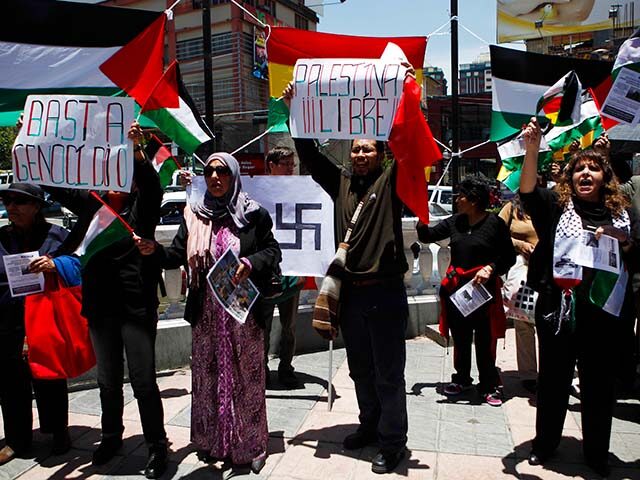Joseph Humire, executive director of the Center for a Secure Free Society (SFS), asserted that Bolivia is Iran’s “most successful project” in Latin America in an interview published by the Argentine news outlet Infobae on Friday.
Humire warned that, for the past 40 years, Iran has been working to increase its influence in Latin America and has achieved significant success in countries governed by socialists. While there are governments in Latin America that are allied with Iran, he emphasized, the Latin American people are not.

Iran’s Defense Minister Brigadier General Mohammad Reza Ashtiani and his Bolivian counterpart Edmundo Novillo Aguilar signed the defense and security MoU on July 20, 2023. (Islamic Republic News Agency)
“The people do not see Iran as a relevant actor, but as a distant actor, and that is a fatal mistake,” Humire asserted. “Iran has been working on this project for 40 years, and it has already penetrated deeply into the region. This year they sent a warship, their president, and now they are showing their diplomatic muscle.”
“Venezuela, Nicaragua, Cuba and Bolivia are the governments that are doing their work in the region,” Humire observed.
“Iran has been very clear about its objectives since the arrival of the Ayatollahs to power, and knows that in order to advance in the Middle East and the world in general, its obstacle is the United States. In the region it is Israel, but globally it is the United States. And to hinder the United States they have to strengthen their capacity in Latin America,” he continued.
Iran, under the auspices of the socialist governments of strongman Evo Morales (2006-2019) and current President Luis Arce, has managed to deepen its ties with Bolivia in the past decade. Bolivia formally established ties with Iran in 2007 during Morales’ first presidential term.
In July, Bolivia brokered a deal with Iran for the purchase of Iranian drones during an official visit by Bolivian Defense Minister Edmundo Novillo to Tehran. Novillo and Iranian Defense Minister Mohammad Reza Ashtiani signed an undisclosed memorandum of understanding reportedly on defense and security. Novillo said he hoped his trip to Iran would pave the way for wide-ranging cooperation.
WATCH — GOP Sen. Mullin: We Have to Strike Iran, They’ll Back Down if We Do:
Ashtiani stated at the time that relationships between Iran and “like-minded” Latin American countries are an “example of independent countries,” describing the strengthening of Iran’s ties with Bolivia as a “strategic necessity.”
Novillo responded by claiming that Iran “is a model for Bolivia to achieve the freedom of nations.”
Arce’s government announced on Tuesday that it had severed all diplomatic ties with Israel. The decision, the Bolivian Foreign Ministry explained, was in response to Israel’s “disproportionate” operation against Hamas following the October 7 terrorist attack and invasion of Israel committed by the Iranian-funded jihadist terrorist group. Bolivia, under Morales, had previously cut ties with Israel in January 2009, also at a time in which Israel was forced to confront the threat Hamas poses against its citizens.
In his interview with Infobae, Humire analyzed Bolivia’s rupture of diplomatic relations with Israel and the consequences of the growing influence of the Islamic regime in Latin America, a region Humire described as currently “dominated by governments sympathetic to Iran.”
“The decision of the Bolivian government is something that I believe sets a precedent that other countries will follow because Latin America is dominated by governments that are close to Iran,” he explained. “Some openly – like Venezuela, Bolivia, Nicaragua and Cuba – and others not so much, but they do follow their political line, I am referring to Gustavo Petro in Colombia, [Luiz Inácio] Lula in Brazil, and Gabriel Boric in Chile.”
WATCH — McCaul: These Threats Are Linked, “You Cannot Dissect Putin from Hamas from Iran from China”:
“We can also mention the government of Alberto Fernández in Argentina; Cristina Fernandez de Kirchner has always been very friendly with Iran. Bolivia was the first country to make this decision, Venezuela would do it too, but it does not have an embassy in Israel. Bolivia is Iran’s most successful project in the region,” he continued.
Outgoing vice president and former President Cristina Fernández de Kirchner was formally charged in 2015 with having helped cover up Iran’s involvement in the 1994 bombing of the Argentine-Israeli Mutual Association (AMIA), which killed 85 people. The AMIA bombing was the deadliest terrorist attack in the Western Hemisphere prior to the September 11, 2001, attacks. The case was controversially dismissed in 2021.
The case against Fernández de Kirchner was initially pursued by Argentine prosecutor Alberto Nisman, who was found dead on the eve of the corresponding congressional hearing. Argentine authorities ruled his death a suicide.
When asked why he considers Bolivia to be Iran’s most successful project, Humire explained that Bolivia as a country receives “nothing” from Iran’s partnership with the South American nation but the government – namely, the ruling Movement Towards Socialism (MAS) party – does benefit.
“MAS has been aligned with Iran since the beginning, since the time of Evo Morales. They receive a lot of support from Iran in everything related to how to use the system to stay in power,” Humire stated. “Iran has advised them on how to handle the opposition, how to militarize their borders, how to arm militias. On how to position itself as a regional actor in the face of its neighbors. In that aspect Iran is important not for Bolivia, but for MAS, which has revolutionary aspects.”
The SFS executive director reasoned that Bolivia is using Israel’s current war as a pretext to have a more aggressive stance.
“Everything that is happening in Israel is an Iranian project, so all the alliances that Tehran has in the world are going to start activating against Israel,” Humire asserted. “They are doing this to do Iran a favor, and it is not to gain something in return, but because Iran is the reason why MAS has been able to stay in power for more than 17 years now, with an interruption of one in between.”
In 2019, Morales sought to continue ruling over Bolivia for a third presidential term despite Bolivia having a two-term presidential term limit. Morales was allowed to run after he successfully argued that the two-term limit was a “violation of his human rights.”
Morales voluntary resigned in November 2019 and fled to Mexico amidst glaring evidence of electoral fraud. Jeanine Áñez, who at the time was the second Vice-President of the Bolivian Chamber of Senators, was sworn in as president as everyone before her in the presidential line of succession fled to Mexico with Morales.
Áñez briefly ruled for almost a year, during which she restored Bolivia’s ties with Israel. Áñez chose not to run in 2020’s presidential election, in which socialist Luis Arce was elected. The former president is currently serving a ten-year sentence for allegedly having staged a “coup” against Morales.
Humire continued the interview by explaining that Bolivia’s drone deal with Iran marked the “formalization” of the relationship between them, adding that Iran has been formally providing consultancies to Bolivia since 2010, albeit at a “very limited” manner in terms of training.
“This agreement is to formalize it in the defense industry. I understand that they discussed it on the trip to Tehran, and I think they didn’t sign it yet because they wanted to gauge the reaction before doing it, but the cooperation already exists,” Humire said. “The agreements only serve to legitimize. They want to see the reaction if they send drones, missiles. They are still going to send them, but they do not formalize it. I think they are going to formalize the drones.”
Infobae asked Humire if the stances of countries like Argentina, Colombia, and Chile also help strengthen Iran’s interference in the region without the need to assume such a close alliance like Bolivia’s. Colombia and Chile both withdrew their ambassadors to Israel on Tuesday, citing similar reasons to Bolivia, while Argentina condemned Israel for its actions against Hamas on the Gaza strip.
Humire answered that he does not consider those three countries neutral, but they are trying to be “careful.”
When it comes to Chile, Humire said that not only has Chile allowed sanctioned Iranian airplanes to land within its borders, but that President Gabriel Boric has openly expressed
his intention to open a Chilean embassy in territory controlled by the Palestinian Authority.
“I think he is much more in tune with Iran than he shows,” Humire said.
Humire asserted that Colombian far-left President Gustavo Petro is very close to Iran.
“There are Iranian ambassadors from other countries in Latin America who traveled to Colombia because Petro is in government,” he said. “It is becoming an epicenter of Iran in the region.”
Petro and Boric are both in Washington this week for an economic summit with President Joe Biden
When it comes to Argentina, Humire said that the country has a “double discourse,” due to the AMIA bombing and the upcoming November 19 presidential runoff election. Humire cited the case of a Venezuelan-Iranian cargo airplane seized by Argentine authorities as an example. The airplane, and its pilot at the time, are suspected to have ties with the Islamic Revolutionary Guard Corps (IRGC)-Qods Force, a U.S.-designated terrorist organization and official wing of the Iranian armed forces.
“But with the Iranian plane, Justice did nothing to move forward. They have all the elements, but they let the passengers and the cargo go free? The only reason why the plane is still in the country is because of pressure from the United States,” Humire asserted. “I think [outgoing President] Alberto Fernandez is not distant from them, and we know the history of Cristina Kirchner. The Memorandum of Understanding with Iran that she signed was a betrayal of the homeland, after the terrorist attacks that the country suffered.”
“Prosecutor Nisman denounced it and he is dead,” he recalled.
“These three countries are very close to Iran, but they do not have the political capital to show all their cards,” he continued. “Bolivia, on the other hand, is a country with little legitimacy and does not have to answer to the international community.”
Lastly, Humire was asked why he thinks Latin Americans in general do not pay special attention to the consequences of the Iran’s presence in the region — more so in light of recent events such as the 1994 terrorist attack on Argentina, the socialist Maduro regime selling passports to Hezbollah, and the recent seizure of the Venezuelan-Iranian cargo plane.
“If you ask the Venezuelan people, the Nicaraguan people, they will tell you that Maduro and Ortega are the worst in the world. But they have to understand that behind all this is Iran,” Humire answered. “As long as Iran grows, those regimes will remain in power. The same happens with China and Russia, but Iran has a more important role because it has a lot of experience in terms of asymmetric wars.”
Christian K. Caruzo is a Venezuelan writer and documents life under socialism. You can follow him on Twitter here.

COMMENTS
Please let us know if you're having issues with commenting.